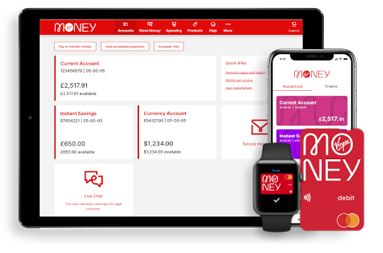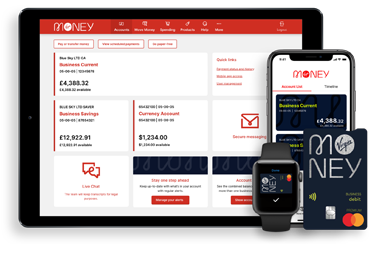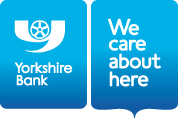-
Login
More Login links
Internet Banking
Business Internet Banking
Started an application?
Other services
Help
-
Register
More Register links
Internet Banking
Business Internet Banking
Other Services
- Our Products More business product links
Bank accounts
- Business current account
- Business choice account
- Switching business accounts
- Compare all business accounts
Savings accounts
Loans and Finance
- All Treasury solutions
Treasury solutions
Help and support
- Online Banking More online banking links
BusinessOnline
- Commercial More commercial business links
Business enquiries
Contact us about a general enquiry.
- Corporate and Structured Finance More corporate business links
Corporate and Structured Finance
SME Cashflow Finance
Unlock your cash flow potential. At Yorkshire Bank we take a flexible approach to business borrowing.
Lending is subject to status and eligibility.
- Our Sector Expertise More sector expertise links
The most useful data from accounting software and what you can do with it
< back to all business news articles
17/01/2018
If you’re using accounting software, every financial transaction a business makes is recorded and tracked. This information can be quite powerful to identify trends and make decisions you’d not otherwise consider. You will also be able to;

- See all your accounts in real-time. The software feeds from your business bank account, so all you need to do is view your cash position inside the software.
- View your financial data anytime, anywhere – as long as you have an internet connection and device. You can update your accounting records on your smartphone.
- Give access to staff (even limited access) so you can delegate tasks such as preparing invoicing.
- See who owes you money on a daily basis.
Making the best use of your financial data
Business planning
One of the most common uses of accounting information is to create budgets and forecasts for business planning. By incorporating accounting data from prior years, you have a figure to start from when projecting sales and expense amounts for the upcoming year. You will be able to:
- Compare last years daily, weekly or monthly sales (every day if you want to) to see how you are tracking. Instead of waiting to the end of the year to identify trends, you can see them more immediately.
- Identify which products and services are selling the best/worst, to help you plan any changes in the product mix. Poor sellers can be removed, best sellers can be promoted.
- Review trends such as wages to sales ratios to determine if you’re paying staff more relative to sales, or if they’re working harder than before/more efficient.
Keeping track of cash trends
Accounting software also gives you the chance to keep tabs on your cash. For example:
- Determine where your cash is coming from. Repeat customers or new? Which provides the best opportunity to grow?
- Which products, services or segments have the best margins, and which have the worst.
- Identify deteriorating margins, especially where it’s traditionally difficult to match suppliers to specific products. It’s easier to see if you’re slowly paying more for raw materials or inventory than before.
- Track your customers spending habits– who are the most frequent? How much are they spending?
- Spot the habitually late payers who need to be either followed up early, or possibly you no longer want to sell to them.
- Track the small expenses that often are hard to measure. Are phone bills or office expenses going up compared to sales?
Understanding the cash trends of your business means you’re in a better position to take action to improve your profits. Accounting software is the new tool to help you get this data daily.
Business analysis
Some small business owners review their accounting information on a monthly basis by comparing actual sales, expense and profit performance to projected performance. If there are substantial variances in projected versus actual, business owners can implement changes to deal with these differences. That's why it's important to review your accounting data on a frequent, regular basis, because you'll become more adept at spotting small issues before they become large problems.
Investment decisions
If you find you have a cash surplus, your accounting data can determine when to invest these funds. By examining the business's cash projections, you can determine how much cash is needed in the short term and how much will be needed in the long term.
Summary
Investing in good accounting software can provide you with up-to-date information about your financial data. Even if you use an accountant, you should have access to your business’s accounting records so that you can see at a glance what your financial position is and how best to use that data to improve it. If you do have an accountant, make sure you sit down with them on a regular basis and discuss how best to use it. The more informed you are about your business’s financial position, the better placed you’ll be to make decisions and predictions about its future.
POSTED IN: 2017,Growth
SHARE
Related Articles
You are here: Business Banking > Business News > Articles
- About Yorkshire Bank
- About us
- Virgin Money UK PLC
- Media relations
- Careers

Internet Banking has moved
To log into Internet Banking you now need to use Virgin Money Internet Banking. You'll get the same great service and are able to access all your accounts.
Your log in details will stay the same and you can log in directly from the shiny new Virgin Money website.
Continue to Virgin Money Internet Banking
Go to the Virgin Money website
Be Alert
Never tell anyone a token 3 response code, even someone from the bank. You should only input these codes to our secure Business Internet Banking service when you’re sending and making payments. If anyone calls and asks for a token 3 response code or asks you to authorise a payment on the App for fraud checks, hang up and call us on 0800 085 2914 from another line if possible, remember the Bank will never ask you to disclose your security details.
Continue to Virgin Money Business Internet BankingYou can find impartial information and guidance on money matters on the “MoneyHelper” website.
Yorkshire Bank is covered by the Financial Services Compensation Scheme (FSCS), Find out more.
